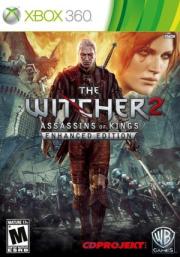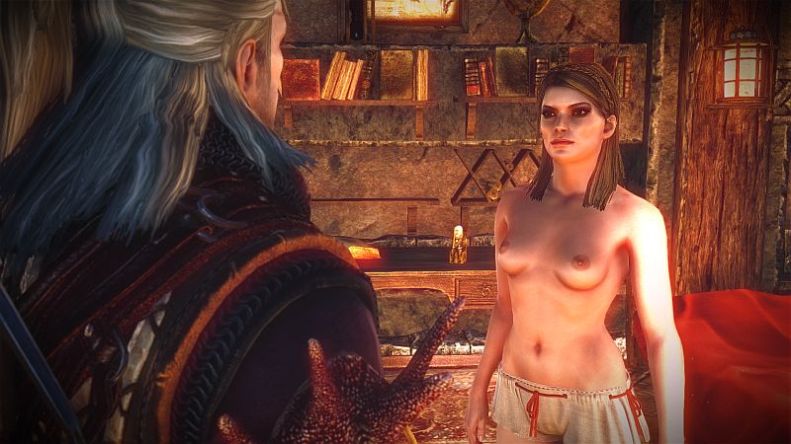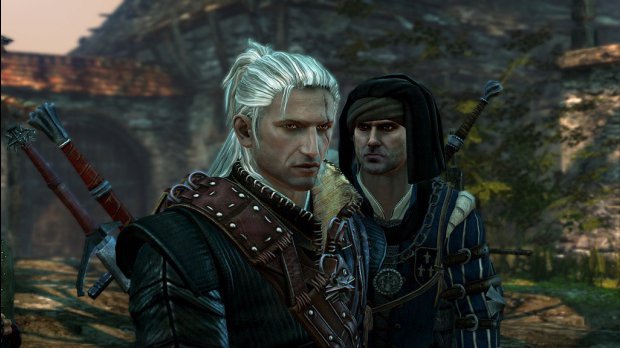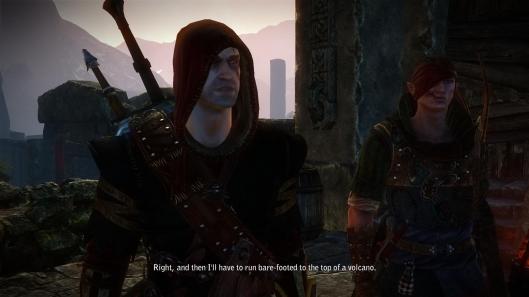Tags
cd projekt, rpg, witcher, xbox
 Spring last year I was patiently waiting for the PC release of The Witcher 2. I had a collector edition preorder that I never got, and, when I had to buy presents for my friends, I usually bought them this game. The only problems was that, with all my good intentions, I’m not a PC gamer anymore – I’ve been paying consoles for the last 4 years, so not being able to play in whatever ridiculous position I can think of is not an option anymore. But, CD Projekt RED being such nice guys, they thought why not release an XBOX version, so that all the lazy gamers, like me, can enjoy Geralt’s new adventure. So, without much further ado, here I am, having just finished (dinner and two cigarettes ago) the game. There’s a lot to be said about how cool the guys at CD Projekt are (they even sent me a review copy, because I’m that good), but you better take my word on this so that we can focus on the game.
Spring last year I was patiently waiting for the PC release of The Witcher 2. I had a collector edition preorder that I never got, and, when I had to buy presents for my friends, I usually bought them this game. The only problems was that, with all my good intentions, I’m not a PC gamer anymore – I’ve been paying consoles for the last 4 years, so not being able to play in whatever ridiculous position I can think of is not an option anymore. But, CD Projekt RED being such nice guys, they thought why not release an XBOX version, so that all the lazy gamers, like me, can enjoy Geralt’s new adventure. So, without much further ado, here I am, having just finished (dinner and two cigarettes ago) the game. There’s a lot to be said about how cool the guys at CD Projekt are (they even sent me a review copy, because I’m that good), but you better take my word on this so that we can focus on the game.
In The Witcher you play as Geralt, a paid professional slayer of beast that is just recovering from amnesia (and from having played a major role in a non-human riot and stopping the plans of the Grand Master of the Order of the Flaming Rose – but that only if you also played the first game). The new game finds Geralt as King Foltest’s new bodyguard, while a siege is happening. Triss Merigold’s naked body also stars in the exposition of the game – and when I say naked I mean playboy centerpiece naked. You might have noticed that I’m a few phrases into this review and you are already getting confused with so many names. That’s only because the game is based on the books by Andrzej Sapkowski, so it has to work with a lot of background; sometimes you are filled in on what happened in the past, sometime you just have to go and read the source material, or you’ll have no clue what the big deal about Yennefer is.
The story can be split in two threads. First one is the political one – as the title suggests, kings start getting killed and Geralt gets pulled into the geopolitical drama in the region. On your quest to track the assassin you’ll meet royal spies, rebels and murderers, ambassadors and other, alive, kings, and sorceresses; a lot of sorceresses. This part unfolds a la Game of Thrones style, with lots of factions, each one taking care of itself by whatever means necessary. The second part is Geralt’s personal quest, one to regain his memories – and I have to say I was a bit surprised by this. You see, when the first game of the series introduces us to a hero that couldn’t remember anything, I expected they would go on the same path from here on, and we’ll never know whatever happened to Geralt. This is the part that requires you to know some of the background to really appreciate it. Or maybe I found it really satisfying since I have already read the books (at least the two that are available in English) and I could enjoy how things tie up. Overall, the story is as advertised – matured, well written and dark. Don’t let yourselves be fooled by the somewhat standard fantasy setting – there might be elves and dwarfs in the game, but this is not the Shire. The world of The Witcher is ruled by humans, with non-humans living in ghettos and being oppressed. The witcher is no hero; he’s just a slayer for hire that gets caught up in the events around him. He’s also a symbol of the dying world, as the world is changing its pace and the need for witchers and out-of-the-ordinary things seems to be diminishing. Besides the main quest there are side quests, which are just as interesting as the main ones. Even the fetch and deliver ones (the witcher contracts) require you to do some preparations and figure out how to complete them. Ad everything is very well connected, as you might be on your way to a main quest and you won’t be able to complete one or two secondary quest on your way, just because the lit up your interest.
The game is a great improvement over its predecessor. While the PC version was one of the best looking games of last year, the XBOX version doesn’t put it to shame. Everything looks really good, but what really draws you in is the level of detail in everything – at one point I was just staring at my armor, following how its bits and pieces are sown together. And, speaking of armors – there are lot more of these this time, so you spend your witcher days hunting for crafting diagrams and materials in order to get the next best thing. The same for swords and each one has its individual look, so you might end up using a weaker silver sword, just because it looks better on your back. And if the stock options aren’t good enough for you, you can always upgrade them. The inventory is a bit of a mess, but only because there are a lot of thing that you can pick up. Usually you be picking up flowers, wood and leather and whatever crafting components you’ll find, just to store the for later use. My questions would be why are we still using the limited inventory in games? Things would have gone a lot smoother without a limit – the inventory is split in tabs, and there usually aren’t that many things in the sellable objects tabs. Instead you have to run around, storing ingredients and then coming back later to take them to a blacksmith. And another thing: crafting materials, especially rare ones, shouldn’t be so easy to use as alchemy ingredients. This morning I was looking for a smith to forge me an armor, but to get to him I had to get through a sewer infested with monsters; so why don’t I make myself a potion. Everything was great until I actually reached the smith and noticed I use one of the required components for the armor, and that I could get it from nowhere else.
The combat has been changes, so gone is the mad clicking from the first game. The developers stated that they were going for a Dark Souls feel (both in how you control the character and the difficulty level), but the sort of missed that thing. Not that it’s a bad thing, as having two games that kill you with every occasion they get and then take everything from you is enough for me. The Witcher 2 misses that spot because one you get some levels in swordsmanship the fights become easier, some of the being button mashers. But what button mashers: Geralt leaps though the battlefield, spinning, dodging, sometimes dancing, and cutting everything in his path. For character advancement there are three paths: swords, magic and alchemy. I don’t know why you might choose alchemy, but it’s there. By the time I finished the game I was level 35 and had points in both and magic trees. At the end of the tree there’s a finisher move that activates when you attack/cast signs enough (although there’s a word thing – I got the swords finisher first and then the magic one, so then I was left with the one from the magic tree, which was a lot lamer).
Before I get to the interesting part, a few words about the characters and the voice acting. Initially I thought that the voices are way off – for example Triss sounded more like a sissy that a powerful sorceress. But one you progress, you realize that they fit in perfectly and they even help you understand the character better – sure Triss is a powerful sorceress, but she’s also sensitive and care a lot about Geralt, so those things pop up in her voice. But the biggest round of applause goes to design and voiced the assassin: he looks like a dumb, bulky guy that has a slick American accent and talks like doesn’t care about much and he could just squash you in a second. Oh, and did I mention you old friend, the womanizer bard; or Zoltan, the sean-connery dwarf; or the lesbo sorceress? And the list could go on.
And finally, the thing we all came here for – choices. But, first, I would like to reshare my favorite story from the first game: I was in the second chapter, a bit stuck with my quests. After some investigations, I found out that a drug dealer might have the information I’m looking for, but as I entered the inn he was staying in, I found him with an arrow through his chest. The thing is, in the previous chapter an elf has begged me to let him steal some crates that were supposed to have supplies for his starving friends. Instead, those crates had weapons, and they have used them to enact revenge on their enemies, leaving me to find a walkthrough to find out how to move further. It’s this sort of small things that made the first game really great – you do something now and ten hours of gameplay later you see its consequences. The Witcher 2 drops this sort of little things. Sure, you can help the families attacked by soldiers and they repay you later. You can save the whores, instead of running after the commandant, and you’ll get a free plough later. Or another choice that might be a bit spoilerish to mention here. These small choices exist, but they don’t have the same impact as what I have described in the beginning of the paragraph. What you will get instead, is a game altering choice – at the end of the first chapter you have to choose who you’ll accompany: the elf rebel Iorveth or the commander Vernon Roche. Based on this choice you find yourself on different sides of the conflict in chapter two, and it will also influence your quests in the last chapter. What worried me when getting close to this choice was that I won’t have enough information in order to decide. But after talking with both you can pretty much see what they are about and you have to decide what kind of world you want to create for yourself and everyone else. Or, better yet, what kind of witcher are you: one that idly stands by, not getting involved in the world around him; or one that fights for what he believes in, even if that’s not his job. I ended up siding with Iorveth, but I regretted a bit abandoning Vernon after everything he had done for me. But, there’s always a second play through.
It’s a lot easier to write about games that are not so close to perfection – you find the flaws and criticize them in the funniest way possible. Unfortunately The Witcher 2 leaves no room for this, being one of the best games I have ever played, in some way reminding me of how I felt when I first played Baldur’s Gate 2. If I would give scores, I would give it the second best score, but only because games like this make you want perfection. Excellent job CD Projekt RED and, please, keep them coming our way.
My favorite type of magic – lesbomancy. (Dwarf scratching his nuts)




Hello Dan, I would like to get in touch with you about sending you the prize for your entry in our “Become a pro reviewer” contest, could you please contact me?:)
Hi Marcin,
I have sent you an email.
Thnks,
Dan